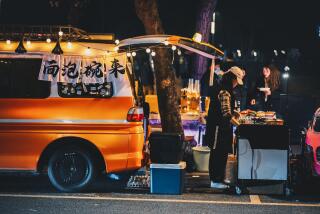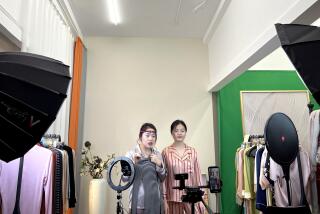Chinese City Is a Hotbed of Capitalism : Commerce: Wenzhou has privatized most of its economy and allowed entrepreneurs to grow rich by Chinese standards.
- Share via
WENZHOU, China — Ke Jiayou made more money in the last five months of 1991 than the average Chinese worker makes in eight years.
Ke and a partner, both musicians, opened a men’s boutique in August, selling expensive imported clothes. They now have three stores, including one for women, and plan to open a children’s-wear shop next year.
In a nation that has preached plain living and sacrifice, Ke, 31, and He Wei, 26, are not exactly the communist ideal. But they are not unusual in Wenzhou, a small coastal city that is more capitalist than socialist.
While most Chinese cities experiment cautiously with free-market methods, Wenzhou has privatized most of its economy and has allowed entrepreneurs to grow fabulously rich by Chinese standards.
The “Wenzhou model” drew praise in the mid-1980s, when China’s economic reforms were at their height, but fell under a shadow in the conservatism that followed the crackdown on the pro-democracy movement in 1989.
Officials do not boast about the size of the private sector or individual wealth.
Mayor Chen Wenxian said only one-third of the Wenzhou region’s 6.7 million residents have annual incomes equivalent to $600 or more, but citizens say reporting low earnings to avoid taxes is common. The average urban income elsewhere in China is about $480.
The official newspaper China Daily said about 90% of Wenzhou’s economy is private. Chen put the figure at 38%, but even that is several times the national average.
Whatever the numbers, Wenzhou’s capitalist bent is clear.
“We don’t care about politics. We just want to make money,” said Zhang Xueguang, one of thousands of private taxi drivers who clog Wenzhou’s narrow streets with two-cylinder Fiats made in Poland.
Wenzhou, historically a center of trade and commerce, is driven by the pursuit of money and proud of it. Visitors frequently hear the saying, “People are making money, spending money and eating around the clock in Wenzhou.”
Lu Xiaoqiu and her husband, also taxi drivers, are typical. They used to work in a state-run drugstore that paid each of them $40 a month.
Two years ago, they quit and bought a Fiat. By driving from dawn until late at night in alternating shifts, they earn about $6,000 a year.
Last year, they spent $1,600 to redecorate their apartment, which they describe as still “very ordinary and plain” when compared with homes in the city with marble floors and imported lighting fixtures. Lu wears a thick gold bracelet, gold rope chain and four gold rings, all 24-karat.
It is to such conspicuous consumption that Ke and He cater at their boutiques.
Prices at the two men’s stores, both called Blackies’, start at $52 for a simple sport shirt. A sign says, “We accept Hong Kong dollars.”
Dark wood paneling, warm track lighting, carpets, photographs of Western models in European settings, black mannequins and loud rock music are a dramatic contrast to sterile state stores, where clothing hangs in rows against bare white walls.
Miss Blackies’, for women, cleared nearly $1,000 on opening day from customers unfazed by such prices as $135 for a skirt-and-top set from Hong Kong.
Ke said he earned $3,700 in the first five months at Blackies’.
“There’s nothing wrong with capitalism. It’s very practical,” said the former musician. He owns a three-story home and rides a black Honda motorcycle, both beyond his dreams when he played in an opera-company orchestra.
When he was a child, people who sold a few packs of cigarettes were attacked for being capitalist, Ke said, and he sometimes worries about policies changing again.
His wife, who runs her own shoe factory with 50 employees, is more confident: “I’m not afraid. This is the trend, and nobody can stop it.”
More to Read
Sign up for Essential California
The most important California stories and recommendations in your inbox every morning.
You may occasionally receive promotional content from the Los Angeles Times.













